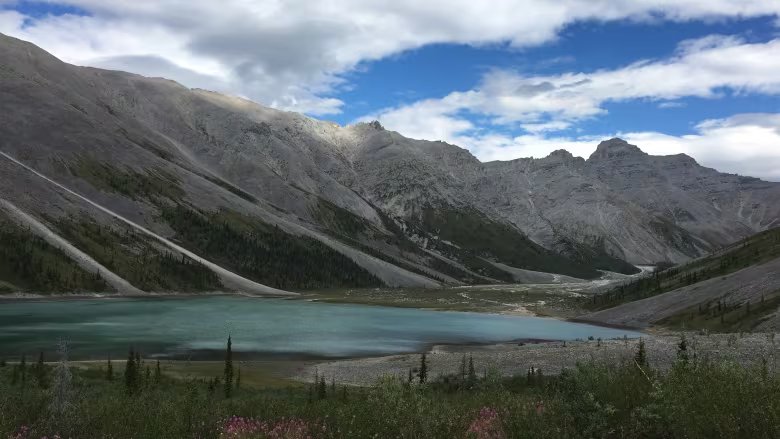First Nations accuse Yukon gov’t of taking company’s side over exploration project

Two Yukon First Nations say the territorial government did not consult with them about a recommendation against approving an exploration project in the Peel watershed — and on their traditional territory — before taking the matter to court.
In separate responses filed to the Yukon Supreme Court this month, the First Nation of Na-Cho Nyäk Dun (FNNND) and Trʼondëk Hwëchʼin (TH) accuse the Yukon of taking the side of industry and undermining both the First Nations’ final agreements and the regional land use plan.
“Yukon must act in a way that accomplishes the intended purposes of the Treaty and the Peel Plan,” FNNND’s response reads.
“Yukon failed to give any consideration to accomplishing those objectives before it decided to commence this litigation instead of engaging with its treaty partners and fulfilling its co-management responsibilities.”
It’s the latest in a developing court case that both First Nations want dismissed.
The Yukon government, earlier this year, filed a legal petition against the Yukon Environmental and Socio-Economic Assessment Board (YESAB), alleging the board’s Dawson City designated office unfairly recommended against allowing a project by the Vancouver-based Silver47 Exploration Corp. to proceed.
The project would have seen Silver47 do five years of exploration work on claims surrounding Michelle Creek, near the northern tip of Tombstone Territorial Park and on both TH and FNNND traditional territory.
The FNNND and TH opposed the project, arguing it would do irreparable damage to the land and their culture and heritage, which the YESAB office ultimately agreed with. The office also agreed that Silver47 failed to collect environmental baseline data for the area in order to meet requirements set out in the Peel Watershed Regional Land Use Plan, something that the Yukon and Silver47 now dispute.
The project was the first in the Peel watershed to go through the YESAB process since the signing of the plan.
The Yukon wants the recommendation, issued in December 2022, quashed, and for the office to re-do the project assessment.
In their responses, filed Dec. 14 and 15, the FNNND and TH argued that the YESAB recommendation was reasonable and should be allowed to stand.
FNNND Chief Dawna Hope and TH Hähkè Darren Taylor were not immediately available for comment.
Department of Energy, Mines and Resources spokesperson John Thompson declined to comment on whether the Yukon consulted with the First Nations on the YESAB recommendation or its communication with Silver47, citing the ongoing court proceedings.
Yukon received ‘lobbying letter’
The First Nations’ responses and supporting affidavits and documents, however, provide a peek into what was happening behind-the-scenes.
After the YESAB designated office issued its recommendation in December 2022, TH and the FNNND were expecting the Yukon government to begin consultations on what to do next — namely, to accept, reject or vary the recommendation. Their responses note the Yukon government’s obligations to do so under the First Nations’ final agreements and the Yukon Environmental and Socio-economic Assessment Act.
“Although Yukon never commenced consultation with FNNND, FNNND thought consultation was forthcoming. FNNND never received any indication otherwise,” the First Nation’s response reads.
The Yukon government, between Jan. 18 and April 20, “sent correspondence to FNNND delaying consultation … but indicating that consultation and a draft decision document were forthcoming,” the response continues.
However, “unbeknownst to FNNND at the time,” the Yukon had received a “lobbying letter” from Silver47 on Jan. 11, outlining the company’s concerns with the YESAB recommendation — many of which ended up being mentioned in the Yukon’s petition.
“From February 7, 2023, to March 24, 2023, while Yukon was advising FNNND that it would soon be issuing a draft decision document for consultation with FNNND, Yukon was in fact contemplating a ‘challenge to YESAB’ on the Recommendation,” the First Nation’s response reads.
Court documents show that FNNND Chief Hope and then-TH-chief Roberta Joseph sent a joint letter to the Yukon on April 26 requesting that consultation begin.
However, the Yukon filed for judicial review May 29 “without any further engagement with FNNND,” the First Nation’s response says.
TH’s response echoes FNNND’s, stating that the Yukon “corresponded directly with Silver47 and elected to, without any prior notice to TH, commence these proceedings.”
Silver47, while originally not a named party in the legal proceedings, filed its own response to the petition earlier this year, supporting the position that it was not required to provide baseline data and that the project assessment should be re-done.
Petition ‘not the interests of Yukon or the public’
Besides the lack of consultation, TH and the FNNND’s responses argue that both the Yukon government and Silver47 had known about the requirements projects would be subject to under the Peel plan for years, and were also aware of the First Nations’ positions during the assessment for Silver47’s proposal. However, they say, the Yukon failed to raise any concerns during the assessment process, in which it was an active participant, while the company had “ample opportunity” to address requests for baseline data but didn’t do so.
Neither side should be allowed to bring their concerns forward after the fact, the First Nations argue, with the FNNND adding that the Yukon, in its petition, is raising grounds that “support [Silver47’s] interests, not the interests of Yukon or the public.”
“Yukon should not have commenced this proceeding… This proceeding is an improper attempt to alter the record for its own statutory decision,” the response says.
TH, meanwhile, describes the recommendation as “transparent, intelligible and justified in respect of the facts and law.”
Both First Nations also emphasized the Yukon’s wider obligations under their final agreements.
“At the core of the Treaty and the new relationship it promised is the Crown’s commitment to guaranteeing FNNND’s meaningful participation in decision-making about its Traditional Territory,” the First Nation’s response says, noting that it made “very difficult compromises,” including giving up Aboriginal title for most of its traditional territory, during negotiations.
“FNNND expects Yukon to comply with both the Treaty and the legislation through which the Treaty is implemented… Yukon’s conduct is prejudicial to the regulatory process and detrimental to its treaty relationship with FNNND and other affected First Nations.”
“In electing to commence these proceedings, [the Yukon government] has failed to give proper or any consideration to accomplishing the objectives of the Final Agreement,” TH’s response reads.
“[The Yukon government’s] positions are contrary to its obligations under the Final Agreement, its agreement with TH on how the Peel Plan should be implemented, and the honour of the Crown, and its petition must be dismissed accordingly.”
Related stories from around the North:
Canada: New Indigenous protected area created in Northern Canada, CBC News
Norway: Deal protects Arctic waters around Svalbard, Norway from fishing, The Independent Barents Observer
Russia: Island in northwestern Russia becomes nature reserve, The Independent Barents Observer
United States: U.S. government signs new land swap for Alaskan wildlife refuge road, Alaska Public Media



